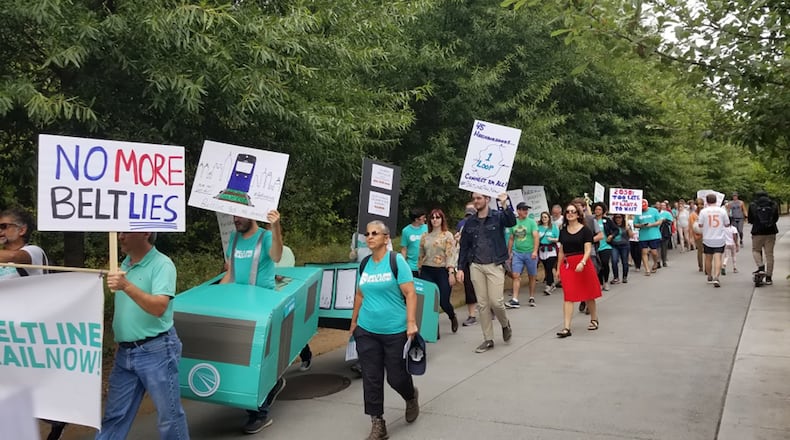More than 50 activists marched down the Atlanta Beltline on Sunday chanting, “We pay the tax. Now lay the tracks,” as they passed million-dollar town homes and posh eateries — hallmarks of exclusivity, they say, not the economic equality the project was supposed to foster.
The group that organized Sunday’s protest, BeltLine Rail Now, says that the key to realizing the project’s original vision lies in an accelerated plan to build more light rail that allows people to navigate the city without a car.
And organizers said that’s the plan they were originally sold when MARTA and the city of Atlanta urged voters to approve a transit sales tax in 2016.
Now they say that other projects have been prioritized ahead of the Beltline — a path encircling the city that will eventually connect 45 intown neighborhoods with a 22-mile loop of multi-use trails.
“What we’ve got is a sidewalk to gentrification,” said Matthew Rao, co-chair of BeltLine Rail Now. “Without the transit, we’ve got more cars and more parking and we end up with an asset that only the fit, the young and the wealthy can use. And we pay for it with our tax dollars.”
Last week, in response to the announcement about Sunday's march, MARTA issued a statement saying it "understands the disappointment of Beltline supporters as the reality of a transit-connected loop of intown neighborhoods has proven more time consuming and costly than originally estimated."
In May 2018, MARTA officials unveiled a list of projects that the sales tax would fund. It included 22 miles of light rail in the city and 18 miles of bus rapid transit (BRT), but only about seven miles of Beltline rail.
BeltLine Rail Now members lobbied the agency for a greater share of rail for the Beltline. Within months MARTA revised its list.
Like the initial proposal, the final recommendation allocated $370.2 million for seven miles of light rail along the northeast and southwest portion of the Beltline. It also added another $200 million for a down payment on another eight miles of rail along the northeast, southeast and western portions of the 22-mile loop.
But the latest incarnation of the list pushes the construction of some of the Beltline rail segments into the 2040s.
“Most of us will be gone,” said Michael Looney, a 55 year-old construction safety manager who marched on Sunday. “I have kids here. … We would like them to see it before they are my age.”
About the Author
Keep Reading
The Latest
Featured


